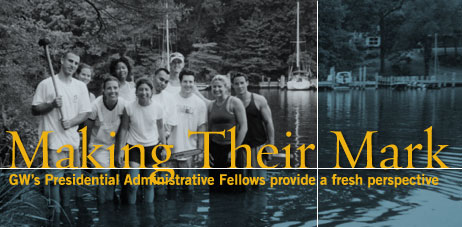
Near Annapolis, Md., the PAF Class of 2003 aids in a Chesapeake Bay service project as part of its orientation and training retreat.

By Laura Ewald
More than 15 years ago, as his first full year at GW was drawing to a close, President Stephen Joel Trachtenberg approached then-Student Association President John David Morris, BA ’90, MPA ’93, with a proposal. Impressed by the enthusiasm Morris had for the University and eager to hear a student’s perspective on how to improve the institution, Trachtenberg hired Morris for the next two years. In exchange for doing everything from greeting the Uruguayan ambassador (whose embassy was on campus at the time) to writing the script for the tour on the University’s double-decker bus, Morris gained professional work experience and earned his master’s degree in public administration.
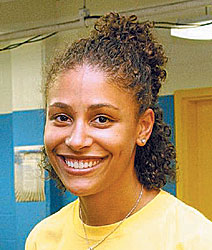
PAF alumna Sara Holmes, BA ’01, MPH ’03
|
“President Trachtenberg told me he wanted to capture the vigor of the student body and use it to improve the University,” Morris says.
Because his tasks were so varied, Morris worked under the generic title of “presidential intern.” What began as one student covering miscellaneous duties has expanded to an organized corps of 13 students, each one serving in an area that directly links to his or her education, interests, and future careers. They are the Presidential Administrative Fellows, and each lends energy and knowledge to GW for two years while pursuing professional excellence and advanced degrees.
President Trachtenberg recalls his vision for the program. “My goal in establishing the PAF program was to enhance GW both now and later,” he says. “Now, by adding these bright young people to the University staff, where their contribution would make the institution more user friendly. And later, I expect the alumni of PAF to play continuing roles in the life of their alma mater—some arguably as tomorrow’s Trustees.”
The program has rapidly evolved since its inception, but one constant remains: The fellows are consistently selected for their love of GW and their desire to make a positive and creative impact.
“Students target themselves to be fellows. They are usually people who get involved as early as possible as freshmen and generally grow within an organization, be it the student newspaper or a sorority,” says Peter Konwerski, BA ’91, MA ’94, EdD ’97. Konwerski, assistant to Senior Vice President for Student and Academic Support Services Robert Chernak and executive director of administrative partnerships, helps to manage the PAF program. “Many times, these are individuals who have already gained a reputation as intelligent, hard-working students,” he says.
Once the PAFs are selected, they go through a training process that involves information meetings with their peers and supervisors; discussions on how to bridge the gap between being a student and a professional; a retreat in which they develop communication skills and participate in a service project such as working on a house for Habitat for Humanity; and set specific goals for the year to come.
Konwerski says that the training process is in some ways arduous for the students. “Every one of these individuals is a leader and is used to taking charge and being heard. So sometimes the fellows have to learn how to sit back and let someone else take the reins so that they can work together as a team,” he says.
Current fellow Fiona Conroy, BA ’04, who is working for the Office of Student Judicial Services as she pursues a master’s degree in political management, says it is important for the fellows to go through this continuous training and development process.
“While the rewards of the program are great, and GW has given me all of the necessary tools to bring about lasting, positive change in this community, it is a very challenging experience. It is difficult to transition into a different role within the same community,” she says.
After the training process, fellows are assigned professional placement according to their fields of study and their career goals. For example, former PAF Sara Holmes, BA ’01, MPH ’03, leant her interest and knowledge to GW’s health services department as an assistant outreach coordinator. In turn, the fellowship helped to shape her career as the director of a teen pregnancy prevention program for the Boys & Girls Club in Washington.
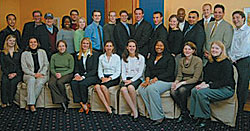
President Trachtenberg (back row, third from left) with PAFs past and present at the 2003 PAF Colonials Weekend alumni brunch at the University Club.
|
“When I entered the work force I felt very well prepared and connected,” Holmes remarks. “I already knew colleagues in my field as a result of my work with GW. I also had experience working with different types of people. One of the most valuable things I learned as a PAF was how to learn from and utilize the people around me, to build relationships. I put that into practice every day.”
During the two years of their service, the PAFs meet every other week to check in with one another, discuss their progress, and make recommendations about the University. They also occasionally talk with vice presidents, the board of trustees, and Trachtenberg to help administrators keep in touch with student concerns. Potluck dinners, visits to University performances, and holiday service projects help the fellows develop friendships within the program.
“PAFs become a very tight group, and because it’s a team of people who work very closely together but have a lot of dissimilar interests and backgrounds, it’s a very interesting and diverse group. But despite all the differences, every one of us is a GW cheerleader,” says Joe Bondi, BA ’01, MA ’03, a fellow who stayed with the University after the program to become director of alumni constituency initiatives. “In that sense, we have a common goal. It’s not just about being an ambassador, it’s not just about the free grad school, it’s about making an impact and giving back to the community. The challenge is to constantly look at what we can do better. And to have decision-makers listening to those diverse ideas, it’s a remarkable thing.”
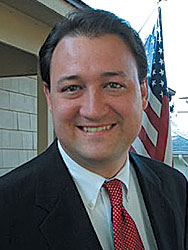
John David Morris, BA ’90, MPA ’93, was the first Presidential Administrative Fellow.
|
Leah Rosen, BBA ’96, MTA ’02, director of Creative Service Communications for the Office of the Vice President for Student and Academic Support Services, has worked with eight PAFs in two different departments. She says the University benefits from the program as much as the students do.
“I have always enjoyed working with the fellows, and I find that in years we don’t have one in our office, we miss them,” Rosen says. “We learn from them what students want, and how to communicate with and market to them. We brainstorm with the PAFs and draw from their ideas all the time. It’s a give-and-take partnership. And because they come from varied majors and backgrounds, and have widespread interests, we learn to work with a different array of personalities.”
“Their undergraduate experience is still fresh in their minds when they join the program, and they gain additional perspective as graduate students,” Konwerski adds. “I constantly hear them say, ‘We are a ready-made focus group.’ They know GW, and they serve as advocates both for what is good and what is bad—what is working for the University and what can be made better. They can articulate the positive aspects and offer constructive criticism. They have a vested interest in the success of the University.”
Recruiting new PAFs is a continuous process that involves everything from putting up posters around campus to mailing students letters from Chernak, a longtime advocate of the program. The PAFs themselves are excellent at recognizing the kind of people who would excel in the fellowship, so they act as informal advisers to potential candidates and advertise the program by word of mouth.
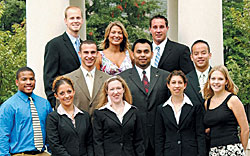
The PAF Class of 2006 gathers at Kogan Plaza.
|
For Bondi, spreading the word about the program fits in naturally with his work, as he spends time with alumni and current students every day. And his decision to stay with the University was made during his time in the program.
“I had such an outstanding experience as a PAF that I had no reason to leave,” Bondi says. “As a fellow, I got my first real taste of fund raising. Now I’m a few years ahead of my peers in the field because I was given a chance right out of school to gain professional experience. Continuing to grow with the University seemed like a natural step.
“I like to talk to students about the program because I hope they will take advantage of such an outstanding opportunity. It’s truly a life- and career-changing experience.”
This year, about 80 students applied for the program. Konwerski says he was impressed both by the number of applicants and the caliber of the students chosen.
“The program is really growing and taking off. And one of the main reasons for that growth is because the fellows are so excited about the program. From the recruitment process to the work the fellows do every day, it’s all about personal connections,” Konwerski says.
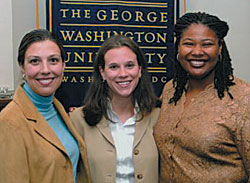
PAF Class of 2004 members Alicia O’Neil, BBA ’02, MBA ’04; Madeline LePage, BA ’02, MA ’04; and Emmanuella DuPlessy, BA ’02, MPA ’04, at Alumni House in May 2003.
|
Those connections continue long after the two years are up, as 50 program alumni and the current fellows gather each spring to rekindle friendships and greet the incoming PAF class. Fifteen years after his time as the first “presidential intern,” Morris has met with and spoken to new groups of fellows several times.
“My GW experience shaped my career more than my Washington experience. That says a lot, considering I worked for the Republican National Committee, a congress-man, and volunteered at the White House,” says Morris, who now is vice president in charge of fund raising for the PBS affiliate WTVP in Peoria, Ill. “Not a day goes by in my professional or personal life that I don’t tell someone about GW, whether it’s a lunch meeting or a college fair. When I meet with the fellows every year, I always tell them that. And I know that, after they complete their programs, they will be able to say the same.”
Back to top | Fall 2004 Table of Contents
|